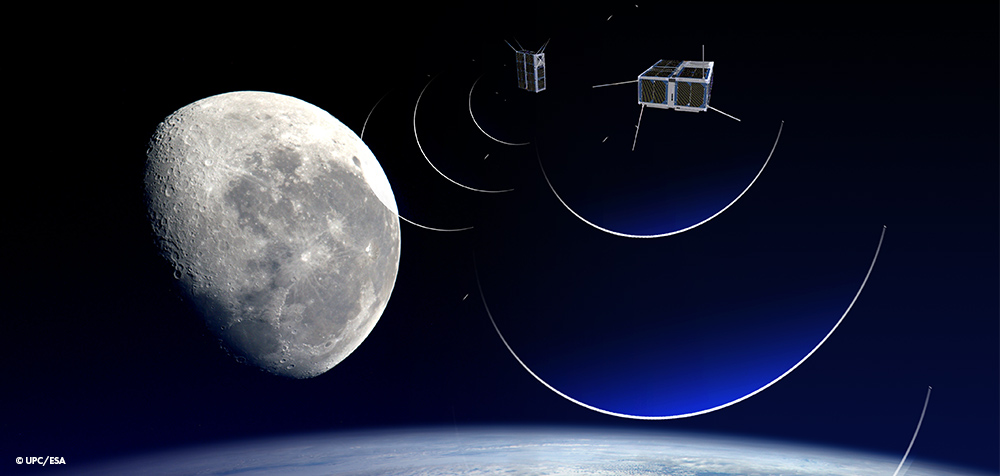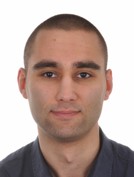
- 2. March 2020
Interview Johannes Schumacher – Finalist OHB Challenge 2019
In the new space exploration age, moon missions are facing many challenges and communication is one of them. Not all locations on the moon are accessible to communication from Earth. This creates a barrier in communication.
The third winner of the INNOspace Masters OHB challenge 2018/19, Celestial, aims to deploy a small-satellite relay constellation in lunar polar orbit. This constellation will be able to communicate and relay data of lunar missions to a ground station.
Regine Heue (RH), Head of Marketing & Communications at AZO, interviews Johannes Schumacher (JS), Founder & Managing Director of Celestial.
RH: In 2019, you have submitted your idea to the INNOspace Masters. What was your motivation to participate in the competition?
JS: The main motivation was to gain credibility within the space industry. Celestial has big, ambitious goals. Especially being a team of university students, people may question if we are capable of developing the technology for space applications and planning an entire moon mission. Therefore, participating in the INNOspace Masters was a very good validation opportunity for our idea. Since OHB is one of the leading companies in space missions, its challenge was our first choice and we expected an in-depth analysis of the technical and business approach of our idea. Aiming for a top position in the competition, it was also the validation for us of whether or not the idea was actually good. Getting awarded among such high-level competitors has also improved our commitment to the project beyond any doubt. Now we are sure it is not only an idea that we are willing to pursue, we can even get the funding for it. Today, we are committed to fulfilling any work, regardless of the challenges in front of us.
Another motivation was the INNOspace Masters challenge prices. For us, the promised engineering support was more valuable than the prize money, which unfortunately is not enough for the entire mission anyway. Besides, the opportunity to present our idea to investors during the awards ceremony was also very valuable to us.
RH: How did winning the Challenge help develop your idea and what kind of support do/did you receive from OHB?
JS: So far, OHB has paid the prize money. OHB also refunded some of the money needed to attend the Paris Air Show. But, even more importantly, as a result of the related promotion of the winning teams, we were approached by a company that is a potential customer. OHB will support us with engineering know-how in the development of our next prototype. We have also received feedback on our project, as a result of which we are ready to put our first products onto the market by early 2020. This is when we will be incorporated as a company.
RH: What is the current development status of your idea?
JS: During the competition, we were able to develop our first prototype. Today, we are developing the second prototype of our communication system as well as innovative antenna designs. This is our base for entering the market in 2020 – as mentioned before.
We also decided to participate in a space habitat test bed project called IGLUNA 2020.
It is integrating international student projects to build a space habitat demonstrator to sustain life in extreme environments. Student teams from various disciplines and different countries across Europe are developing their demonstrator modules and will integrate them into a test bed in Switzerland in July 2020.
We at Celestial, in collaboration with TU Berlin, are one of the 14 teams selected to participate. Our goal is the development and testing of a communication system for a lunar habitat. The system will include customised antenna designs, manufactured using additive manufacturing (AM) techniques, to optimise overall system performance. Our objective is to integrate this system into the test bed and also provide a communication link to the other projects. By the way, our project is the only team aiming to provide lunar communication infrastructure.
Therefore, we are currently looking for industrial partners and sponsors for this project.
RH: Last but not least, what are your recommendations for interested participants of the INNOspace Masters competition?
JS: Offering different challenges from different companies or organisations is extremely valuable to any participants in the INNOspace Masters innovation competition. If you are interested, try to tailor your idea and concept to one of these challenges. Also make sure that the challenge partner has an obvious interest in your technology or use case.
We recommend really putting some effort in. Even if it is a side project for you, be prepared for any questions that may come up. In connection with this, we encourage any participants to ask for feedback – not only once!
Finally: just go for it. You’ve got to be in it to win it.

Celestial
Berlin, Germany